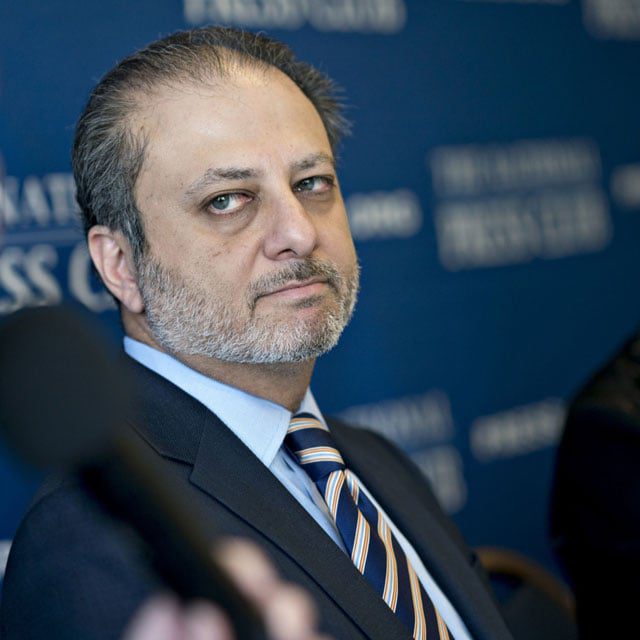Bharara Once Jailed Wall Street Pros. Now He Helps Them Avoid Prison

Preet Bharara knows about the worst consequences of bad decisions: disgrace, career ruin and prison. From 2009 through 2017, he was the U.S. attorney for the Southern District of New York, perhaps Wall Street’s fiercest cop.
And he knows politics. Bharara is now a partner with New York’s WilmerHale, putting him on the defense side.
In an interview with Bloomberg Television’s Sonali Basak in late January, he had some advice for financial pros and thoughts about former and perhaps future president Donald Trump, who fired him as U.S. attorney after he declined to quit. This interview has been edited for clarity and length.
BLOOMBERG: Can mistakes slip into criminal behavior?
PREET BHARARA: Culture is incredibly important to what an institution does, how it meets its bottom line projections, but also how it steers clear of law enforcement actions and Securities and Exchange Commission actions and other enforcement actions.
Probably the biggest mistake I’ve seen made, and it happens incrementally over time, not just on one day and overnight, is avoidance of creating a good, principled culture. Whether it’s at a hedge fund or a financial institution or a tech company, bad cultures begin to permeate the place.
For example, at Theranos [the fraudulent blood-testing company] or at the Galleon Group, which is a hedge fund we prosecuted many people at some years ago, if you allow people to have the view that the exclusively important thing is to make money or to have an edge, then you’re going to create a culture in which you’re going to be attracting people who are not just going to be making mistakes.
You’re going to be attracting people who think it’s in their interest, and in the firm’s, to break the law to increase the bottom line.
What do you tell students entering the financial industry about catching red flags as they go along?
I would speak almost every year to the entire class at Harvard Business School and other business schools. I would say, “Look, I’m here not to address my words to the statistically likely three or four of you who will one day commit serious securities fraud, although I know who you are.”
I’d say, “More importantly, I’m addressing myself to the vast majority of you, the hundreds of others of you who want to do the right thing, who have principles, who have morals, who have integrity. Because here’s what happens again and again.
“There’s going to come a time, a few years from now, you’ll be at a financial institution or a trading firm or some other place, company or institution, and something’s going to feel not right. And you’re going to think the person up the hall, maybe they’re trading on inside information or maybe they’re cooking the books, but something isn’t right.
“The next thing that’ll enter your mind is, ‘Well, what do I know? I’m new. Everyone seems quite nice. I don’t want to rock the boat. I don’t want to make a false allegation. I don’t want to get this other person in trouble, and I don’t want to get in trouble and have people think I’m a troublemaker.’ And then you suppress that impulse that you had. And that’s one of the worst things you can do.”
What was your biggest mistake?
As a general matter, when we open an investigation with respect to somebody—you know, because an FBI agent comes to your door, or we ask for your phone, or we issue you a subpoena — there’s a policy of not telling you when we close the case.
Lots of people are in sort of limbo and paralysis, because they know the government is looking at them, law enforcement investigators are examining them, and then quietly the case goes away.
But they’re never informed. They’re not given notice. So they can’t make decisions about their life, their job, their property, their marriage, their social relationships, where they want to live.
And I now see that in a more direct way, because I represent companies and individuals who are under scrutiny and are being investigated. For the life of me, I can’t figure out why there’s not a better policy in favor of letting targets know when they’re no longer targets.




